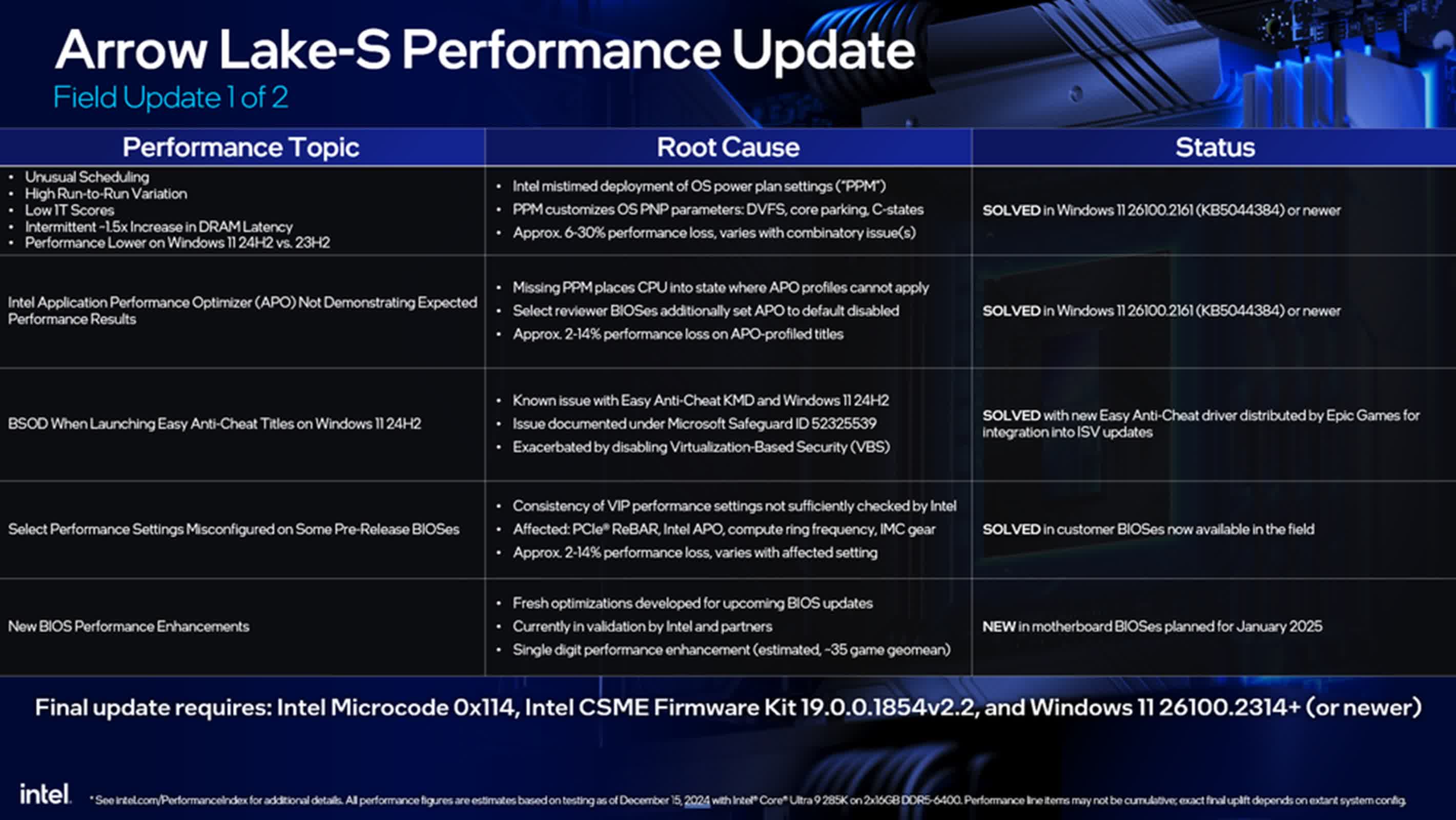Serving tech enthusiasts for over 25 years.
TechSpot means tech analysis and advice you can trust.
A hot potato: As the dust settles on the Arrow Lake launch controversy, users await the promised performance enhancements. However, it remains to be seen if Intel's investigation and forthcoming updates can salvage the reputation of the Core Ultra 200-series.
Intel has come forward with a detailed explanation of the issues that plagued the launch of its Core Ultra 200-series desktop processors, codenamed Arrow Lake, which debuted to underwhelming reviews in October. The tech giant has identified five key problems that contributed to the discrepancy between their internal performance expectations and the real-world experiences of reviewers.
The Arrow Lake processors launched with promises of significant advancements in multi-threading performance, performance-per-watt, platform I/O, and overclocking capabilities. However, users met the release largely with dismay, particularly because of the inconsistent gaming performance. Users and reviewers also experienced higher-than-expected latency and compatibility issues, making the launch feel rushed. After initially remaining silent on the issue, Intel began an investigation to understand and address the gaming-specific reports. By November 8, it had established early indicators to commit to a public root cause analysis and action plan within 4-6 weeks.
At the heart of the issues was a missing Performance & Power Management (PPM) package. This crucial software component, typically distributed through Windows Update or chipset drivers, is responsible for fine-tuning the processor's behavior within the operating system. Its absence led to unusual CPU scheduling behaviors, artificial performance increases when cores were manually disabled, high benchmark variations, reduced single-threaded scores, and unexplained performance differences between Windows 11 versions. Intel estimates that this oversight alone may have cost between 6% to 30% in performance, depending on the workload.
Another significant issue involved the Intel Application Performance Optimizer (APO), a feature designed to enhance real-time thread scheduling optimization within games and the operating system. The missing PPM package created an environment where APO could not function as intended, resulting in no observable performance gains in APO-enabled titles. This malfunction is estimated to have impacted performance by 2% to 14%, varying by game title.
Functionality was also affected, with some users experiencing system crashes when attempting to launch games utilizing the Easy Anti-Cheat service. This problem stemmed from a compatibility issue between Windows 11 24H2 and older versions of the Easy Anti-Cheat driver. While not directly impacting performance, it certainly hampered the user experience.
Intel also acknowledged inconsistencies in BIOS configurations provided to reviewers. Critical performance-enhancing firmware capabilities, such as PCIe Resizable BAR, Intel APO, compute tile ring frequency, and memory controller ratios, were not consistently set to their optimal states. This oversight led to aberrantly high memory latency, fluctuating compute tile ring frequencies, and missed performance uplifts in games that benefit from these technologies. The performance cost of these misconfigurations is estimated at 2% to 14%, depending on the application and specific BIOS settings affected.
Intel has already resolved four of the five identified issues. The company has released updates through Windows 11 build 26100.2161 (KB5044384) to address the PPM package and APO functionality problems. Epic Games is distributing an updated Easy Anti-Cheat driver to resolve the system crash issue. Additionally, current BIOS releases for Intel Z890-based motherboards have harmonized the previously inconsistent settings.
The fifth and final issue involves newly identified performance optimizations that require additional firmware updates. These updates, expected to be released in January 2025, will be identifiable by Intel microcode version 0x114 and Intel CSME Firmware Kit 19.0.0.1854v2.2 (or newer). Intel anticipates that these updates will provide another modest performance improvement in the single-digit range across a broad spectrum of games.
Intel has promised to provide a comprehensive performance update at CES 2025, including a full performance sweep of games and applications, issue-by-issue A/B analysis, and combinatory analyses.


/cdn.vox-cdn.com/uploads/chorus_asset/file/25787622/tcl_ai_the_audition.png)
/cdn.vox-cdn.com/uploads/chorus_asset/file/25799522/LG_B4_Series_OLED_TV_Lifestyle_Press_Image.jpg)






 English (US) ·
English (US) ·